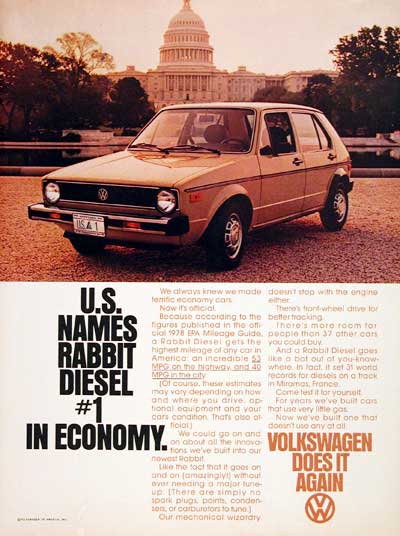2. Diesel engines are heavier
Ah, but they make more torque per unit capacity than their petrol brethren, which helps with acceleration. As per below, if you compare the smallest petrol and diesel engines available for a VW Golf, the diesel is faster and more economical.
Since performance is not the goal of this engine, you could afford to make it smaller in your quest for economy.
Another thing is that some manufacturers have now released all-alloy diesel engines (they've traditionally been cast iron, for strength). With all-alloy, a diesel engine would probably weigh almost the same as a comparable petrol engine for the same displacement / size.
4. Is diesel fuel actually more dense so it weighs more for any given volume too?
5. The gain in MPG/KPL would be much less dramatic so no demand. ...
.if you compare a car with a petrol and a diesel variant the latter is inevitably more fuel efficient despite having a greater weight from the engine and the fuel.
To save weight, given its obvious economy benefits, you could even fit your hybrid diesel with a smaller fuel tank. Give the two cars an equal range, and the diesel will carry far less fuel. This will save weight, and provide more space.
The best comparison for me is the VW Golf, since it comes in a range of petrol and diesel engines. I'll take the values from the auto cars, since hybrids have to be auto. Note that the diesel is a DSG, which weighs more than the conventional auto in the petrol car. Both have an equal number of gears, though.
The entry model petrol is 1.6L with 75kW and 148Nm. The entry model turbo diesel is 1.9L with 77kW and 250Nm. The petrol weighs 1285kg and the diesel weighs 1365kg The petrol's economy is 8.3L/100km, and the diesel's is 5.8L/100km.
The diesel has a 0-62mph time of 11.5s whereas the petrol needs 12.5s, which is an age when it comes to such short-run acceleration.
The diesel, despite the weight handicap, is actually 30% more economical than the petrol while still being faster. I'd hardly say that wasn't dramatic.
Make the fuel tank 30% smaller to have an equal range and you'd save weight, improving economy and performance even further.
To have the cars equal in performance you could also reduce the capacity of the engine and therefore its size (as per Point 2), which would give you the twofold economy gain of lower displacement and reduced weight (which would then give you "free" economy and performance gains again).


